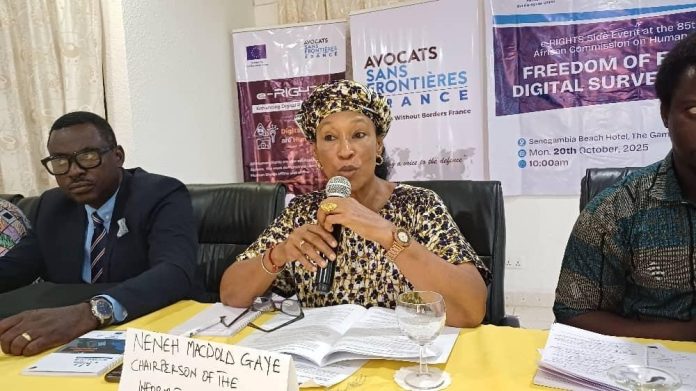By Muhammed S Bah
Chairperson of the Gambia Information Commission, Neneh MacDouall-Gaye, has called for stronger safeguards on digital privacy and freedom of expression in Africa, warning that unchecked surveillance risks eroding democracy and public trust.
Speaking at a high-level side event on “Freedom of Expression and Digital Surveillance in Africa” held on Monday, October 20, 2025, during the 85th Ordinary Session of the African Commission on Human and Peoples’ Rights (ACHPR) in Banjul, MacDouall-Gaye said the digital revolution offers “both promise and peril” for African democracies.
“The exponential growth in internet access and online platforms has opened unprecedented opportunities for civic engagement and journalism,” she said. “But it has also introduced new risks, from unauthorized data collection to online harassment and digital surveillance.”
The forum, part of Avoca San Frontiers’s Enhancing Digital Rights in Nigeria (e-RIGHTS) project supported by the European Union, brought together human rights experts, media regulators, and civil society leaders to examine how regional frameworks can keep pace with emerging digital challenges.
MacDouall-Gaye described the issue as a delicate balancing act between national security, privacy, and the right to information.
“As Chairperson of the Information Commission, I see firsthand how fragile this balance is — yet it is essential to sustaining both trust and democracy,” she emphasized.
The Gambian Context
Highlighting progress at home, Mrs. Gaye said The Gambia’s democratic transition since 2017 has strengthened transparency and access to information through key reforms, notably the Access to Information Act, 2021 and the recent Data Protection and Privacy Act.
“We view data protection as an indispensable complement to freedom of expression and the right to information,” she said. “Because without privacy, there can be no genuine freedom of thought or expression.”
She acknowledged widespread public concern over digital surveillance and urged institutions to uphold accountability while promoting digital literacy.
“Many Gambians fear that their communications may be monitored or manipulated. Whether real or perceived, these fears remind us that awareness and robust legal safeguards are vital,” she noted.
Mrs. MacDouall-Gaye also called for stronger regional cooperation through instruments like the African Union Convention on Cyber Security and Personal Data Protection (Malabo Convention), stressing that “digital surveillance cannot be tackled in isolation.”
“Our responsibility as regulators and advocates is not to resist technology but to humanize it, ensuring that innovation serves development without undermining liberty,” she stated.
The Gambia Information Commission, she added, will continue to champion digital rights, protect journalists and whistleblowers, and promote transparency in government surveillance practices.
A Governance Imperative
Concluding her address, MacDouall-Gaye urged African states to view digital surveillance as a governance issue rather than a technological one.
“It challenges us to redefine accountability, transparency, and human rights in this evolving digital era,” she said. “Our goal is an Africa where technology enhances, not endangers, our democratic values.”
The event underscored growing recognition among African leaders that the continent’s digital transformation must be guided by ethics, human rights, and inclusive governance.





















